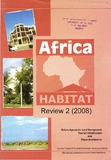| dc.contributor.author | Swazuri, Muhammad A. | |
| dc.date.accessioned | 2016-12-19T12:51:44Z | |
| dc.date.available | 2016-12-19T12:51:44Z | |
| dc.date.issued | 2008 | |
| dc.identifier.uri | http://hdl.handle.net/11295/97998 | |
| dc.description.abstract | Land ownership, distribution, utilisation and exchange amongst the Oigo people of Kenya's lower Coast is done through both formal systems and informal
arrangements. 'Rahani'is an informal arrangement that allows landowners to rent out their excess or idle land at a price over an uncertain duration. Using
data from several classes of respondents, this paper found that landowners practice 'rahani'to get quick money to attend to immediate domestic, personal
and welfare problems. The negative impacts of 'rahani' include the possibility of loss and misuse of the rented land. To the loanees, their benefits include a
chance to reap from land without having to get title for it, as long as the owner is unable to refund the loan amount. Although the practice is still going on, it is
now under threat from formal systems, increased demand for all classes of land and the individualization of land tenure. The concept remains informal and
unclear to many, and has no place even in the proposed National Land Policy | en_US |
| dc.language.iso | en | en_US |
| dc.publisher | University of Nairobi | en_US |
| dc.rights | Attribution-NonCommercial-NoDerivs 3.0 United States | * |
| dc.rights.uri | http://creativecommons.org/licenses/by-nc-nd/3.0/us/ | * |
| dc.subject | land tenure, rent, coast, indigenous. | en_US |
| dc.title | Rahani: A Unique Commercial Land Tenure Arrangement Amongst the Digo of Kenya's Coast | en_US |
| dc.type | Article | en_US |



